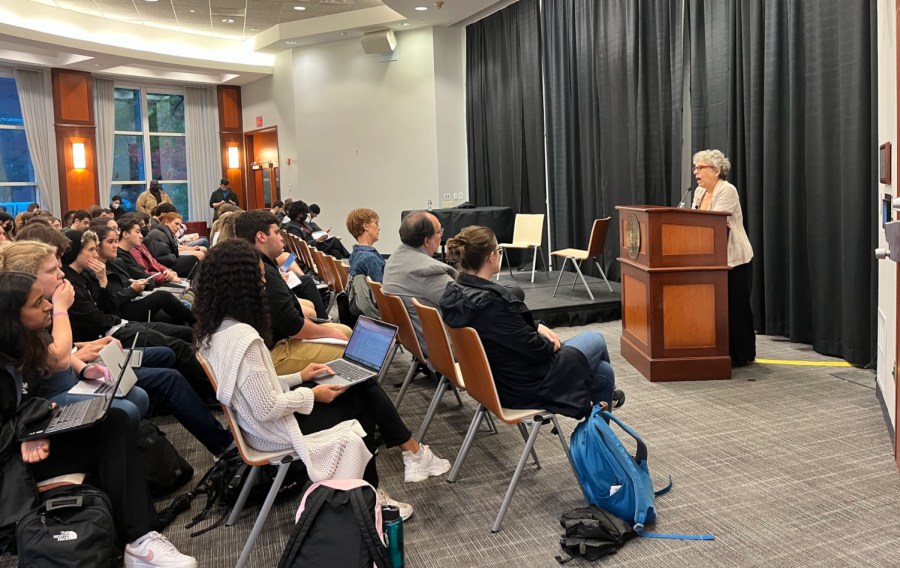Susan Chira shares insights on intersection of journalism, activism
Susan Chira, Pulitzer-prize winning editor-in-chief of The Marshall Project, spoke at Northeastern Oct. 26. She shared her perspectives on the interplay between journalism and activism at the event, “Journalism, Activism and Social Change.”
November 1, 2022
Wednesday evening, Egan Research Center’s Raytheon Amphitheater was packed with students and faculty listening to a conversation about the tussle between journalism and activism.
Members of the Northeastern University community were treated to a unique perspective into this oft-controversial topic from a renowned journalist who has made a name for herself in both mainstream and underdog newsrooms.
Susan Chira, the editor-in-chief of The Marshall Project — a nonprofit news organization covering the U.S. criminal justice system — was the evening’s featured speaker. The Harvard University alumna also was a senior correspondent and editor at the New York Times and was part of the team that won the 2018 Pulitzer Prize for public service for coverage of workplace sexual harassment issues.
Chira shared her thoughts about the role newsrooms play in today’s tumultuous political environment and how The Marshall Project is trying to tread the line between the roles of the journalist and the activist.
“Journalism is indirect. Advocacy and activism are direct,” Chira said. “One of the things about being a journalist … is that you can do your homework and you can expose something is wrong … but journalists don’t have the ability or the mandate to directly call for change or say what that change should be.”
Jonathan Kaufman, director of the School of Journalism, moderated the Oct. 26 event, “Journalism, Activism and Social Change.” His introduction highlighted the widespread relevance of activism through journalism, noting how the event attendees ranged from journalism students to criminal justice and psychology students.
“We try to balance our interest in systemic racism, equity, diversity and all the social justice issues that are in front of mind right now, with the traditional goals of journalism, but also the future goals of journalism and what role that plays in a democratic society,” Kaufman said.
Everyone relies on the news, but those same people have differing individual opinions. Chira said one of the biggest issues currently facing journalists is a desire from audiences to only consume “news” that shares their opinions, whether or not it tells the full story. Chira, however, is a strong defender of fair journalism and the nuanced work journalists must put in.
“The reason I believe in it so strongly … is it means you have to be open to interpretations and frameworks that challenge what you believe or that challenge the mindset in which you enter … your reporting,” Chira said. “You have to be able to stare at contrary or stubborn or elusive facts that don’t support what your preconceptions were. I think that’s really important.”
Nevertheless, activism isn’t completely separate from journalism. Chira highlighted what might be a beacon of hope for budding journalists who want to make a difference through their journalism, noting how journalists indirectly help activists.
“Ultimately, if part of what you do in journalism is to expose problems, if you expose the whole array of messiness in the system, those who are responsible for thinking about solutions will be better equipped to think about them because you will not hide or underplay things that have to be contended with,” Chira said.
Speaking from experience, she provided several examples of how The Marshall Project has tried to deliver fair and humane journalism about the world of criminal justice that mainstream outlets often overlook. She said The Marshall Project works hard to balance all perspectives.
For example, while many in the criminal justice system have committed heinous crimes, they are also often themselves victims of abuse or struggle with mental illness or have been put at systemic disadvantages, Chira said.
“I think what distinguishes journalism from advocacy in many ways is that you embrace complexity, you embrace nuance, you embrace messiness,” Chira said. “In my experience, reality is really messy.”
Chira’s words piqued the interest of many, with several lining up to ask her questions at the end of the event. Matty Wasserman, a second-year journalism major, asked how Chira manages the social media blowback The Marshall Project receives on its criminal justice reporting. Chira said it never gets easier.
The discussion was a helpful look into the world of journalism for some of the budding reporters in the room, leaving students like Wasserman to ponder whether this type of longform journalism can “hold up in the modern era of journalism” when considering complex issues like criminal justice.
Emily Niedermeyer, a second-year journalism major, said she appreciated the realistic perspective Chira offered.
“A lot of times, I’ve heard from people who are progressive journalists, and they talk about journalism as advocacy,” Niedermeyer said. “I think she offered a really unique take that journalism isn’t advocacy. That’s important to know that when you’re going into [journalism], you’re not advocating.”
Regardless, Chira said she doesn’t have all the answers and still grapples daily with the position of journalism in today’s world. She discussed polarized media and the blatant disregard of facts, supporting what she called, “really wrenching questions in journalism right now.”
“What good does journalism do?” she said. “Will people listen, will people actually read anything they disagree with? I don’t have the answer to that, it keeps me up. I think we’re in very perilous times, it frightens me. It upsets me, because I’m prepared to accept facts that don’t necessarily conform with what I would want to believe, I’m prepared to do that in my life. Unfortunately, that ethos is not shared.”


















